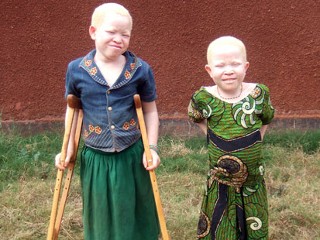
Mariamu Stanford, a soft-spoken, 28-year-old single mother from rural Tanzania, has earned a grim distinction: She's one of only two people with albinism -- a group that has faced discrimination in East Africa -- to survive a brutal attack by those wanting to sell the limbs of albinos on the black market. In her first interview with American journalists, Stanford greeted ABC News visitors with a shy smile, wearing a short-sleeve blouse that revealed the scars of her ordeal.
Last October, men armed with machetes entered her hut and began cutting at her arms in a gruesome attempt to amputate them, Stanford told ABC News.
"In the middle of the night, a group of men stormed in and said, 'We are going to cut your arm off, and if you scream we'll cut the other arm off,'" she said. "And then they started to chop my right arm off. And because I was screaming, they also started to do the same with the other."
Watch the full story on "20/20" TONIGHT at 10 p.m. ET
After her attackers fled, it took six full hours for Stanford to get medical treatment. Five months pregnant at the time, she lost both arms and her unborn child. A devout Christian and member of her church choir, Stanford was caught up in a grisly trade inspired by a renegade set of witch doctors; they claim potions made of the blood, skin or bones of an albino can make people wealthy and bring good luck.
We spoke just outside the two-room mud-floor building, where she lives with her parents, four young siblings and her son, a toddler. Her artificial limbs, donated by a well-wisher, lay discarded because they were painful and cumbersome.
Despite Tanzania's reputation as a tourist mecca known for safaris and visits to Mount Kilimanjaro, people with albinism are being hunted down like animals. Since 2007, 54 Tanzanian albinos, including children, have been murdered by gangs of men who hack off arms, legs or genitals. Observers said even more cases of attacks have gone unreported.
Tanzania is arguably the worst place in the world to be born with albinism -- a hereditary genetic condition caused by two recessive genes resulting in little or no pigment production in the hair, skin or eyes. The country has one of the largest populations of albinos in the world -- an estimated 170,000 -- and they are being targeted
0 comments:
Post a Comment